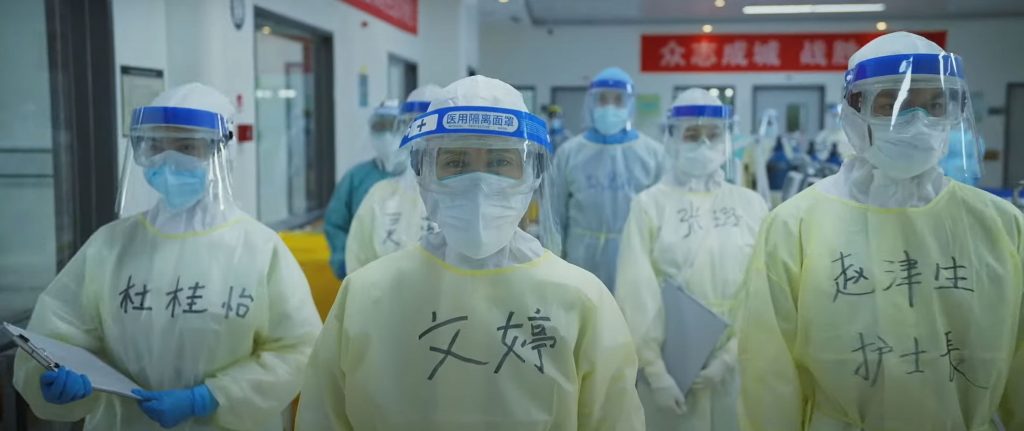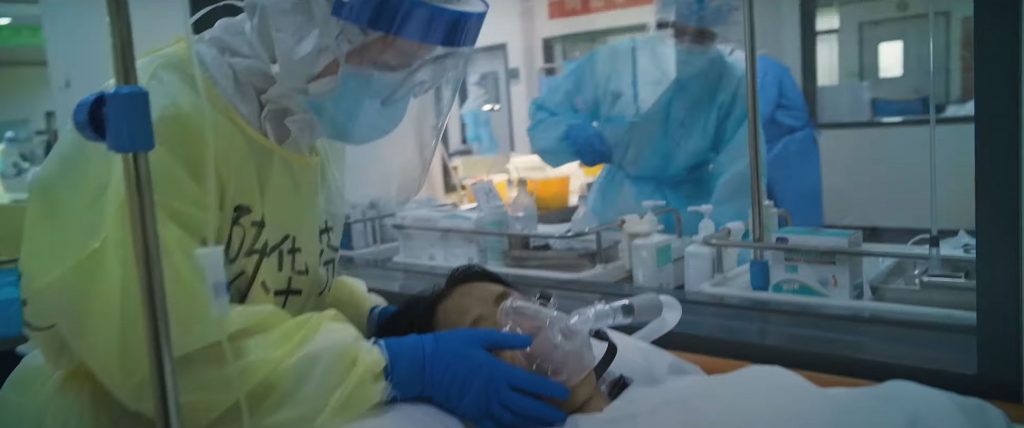August 12, 2021
by Carla Hay

Directed by Andrew Lau
Mandarin with subtitles
Culture Representation: Taking place in Wuhan, China, from January to March 2020, the dramatic film “Chinese Doctors” features an all-Asian cast of characters representing the working-class and middle-class.
Culture Clash: During the several weeks that Wuhan was the epicenter of the COVID-19 pandemic, numerous doctors and patients at a local hospital fight the devastating effects of the pandemic, including sudden deaths, problems with patient overcrowding, a shortage of hospital workers, staffers who are overworked, and various disagreements related to health care and their personal lives.
Culture Audience: “Chinese Doctors” will appeal primarily to people who are interested in a very melodramatic and unrealistically trite version of the COVID-19 crisis in Wuhan.

“Chinese Doctors” horrifically exploits the tragedies of the COVID-19 pandemic by being an unrealistic soap opera about what happened in Wuhan, China, when the city was at the epicenter of the pandemic in the first three months of 2020. Most of the movie is set in an unnamed hospital that quickly becomes overwhelmed with COVID-19 patients in the hospital. Instead of giving valuable and informative re-enactments of what really happened in a Wuhan hospital, “Chinese Doctors” (directed by Andrew Lau and written by Yonggan Yu) presents an accelerated version of a disaster movie, where deaths are just used as drive-by spectacles.
This movie has an abundance of ridiculous, eye-rolling scenes that undermine the seriousness of the subject matter. For example, in real life, numerous infected people showed up at hospitals but were turned away because there was no room. No one rioted over it.
However, in “Chinese Doctors,” this scenario is filmed like an angry mob scene where infected people stormed into the hospital. At one point, the mob becomes so hostile, that a doctor stands up on a table and uses a megaphone to shout: “Do you want to live?” And she makes a threat that if people don’t calm down, “I’ll get even with you!”
It’s a movie where people do perky group dances together in an overcrowded hospital while patients are dying around them. It’s a movie where a doctor yells jubilantly to COVID-19 patients, “We’ll get everyone cured as soon as possible!” (Never mind that while all of this is happening in early 2020, there is no cure for COVID-19 or even a vaccine.) And it’s a movie that seems to revel in its shameless, tacky exploitation.
Aside from the tawdry soap opera elements to the story, the movie’s gaudy cinematography and quick-cut editing are in very poor taste because they emulate music videos or commercials in what’s supposed to be a dramatic film about a deadly pandemic. The death scenes in “Chinese Doctors” are used only as backdrops to the bickering, emotional breakdowns and ego posturing of the doctors. And there are at least two instances where the audience is manipulated into thinking that someone has died in the hospital from COVID-19, but it’s a fake plot development because the person or persons end up surviving.
The movie features several doctors and patients, but only some of them get enough screen time so that viewers get to know their personalities. These characters are:
- Zhang Jingyu (played by Zhang Hanyu), the hospital’s chief doctor, who is in his 50s and who has a compassionate but firm personality. His wife ends up becoming a COVID-19 patient.
- Wen Ting (played by Yuan Quan), a no-nonsense taskmaster in her 40s and who is the highest-ranking female doctor on the hospital’s COVID-19 crisis team. She’s the doctor from the aformentioned scene where she shouted threats to a mob of people in the hospital who demanded service.
- Tao Jun (played by Zhu Yawen), an arrogant doctor in his 30s who arrives from a prestigious hospital in Guangzhou and almost immediately clashes with Dr. Zhang.
- Yang Xiaoyang (played by Jackson Yee), a nervous doctor in his 20s who is eager to impress his more experienced colleagues.
- Wu Chenguang (played by Li Chen), an even-tempered doctor in his 40s who is a trusted colleague of Dr. Zhang.
- Jin Zai (played by Ou Hao), a food delivery guy in his 20s who is certain he won’t get infected because he’s very careful about wearing as much personal protective equipment (PPE) as possible.
- Xiao Wen (played by Zhou Ye), Jin Zai’s wife, who is in her 20s and is about nine months pregnant with their first child, whom they already know will be a daughter.
There are the predictable frantic scenes of doctors trying to keep up with the overflow of patients coming into the hospital and worrying about running out of PPE, medicine, supplies and other necessities. Dr. Zhang leads a task force to recruit volunteer medical workers from other hospitals. It’s how Dr. Tao ends up at Dr. Zhang’s hospital. These two “alpha males” argue with each other about how things are supposed to be done.
Meanwhile, there’s a scene of a female doctor having a tearful meltdown because she hasn’t been able to go home and hasn’t seen her family for days. She’s scolded by another doctor (played by Liang Dawei), who says that everyone is in the same situation. He’s later embarrassed when he finds out from another colleague that the crying doctor’s father recently tested positive for COVID-19. The movie makes a point of showing that the doctors and other hospital workers have worn masks for so long, the masks have left temporary scars on their faces.
The beginning of the movie makes it look like random people could just show up at the hospital, like they would at a shopping mall. But in reality, hospitals during the worst of the COVID-19 crisis were very strict from the beginning about who was let inside the already over-crowded hospitals during this crisis. We’ve all heard the horror stories about people who weren’t allowed to visit their loved ones who were COVID-19 patients dying in hospitals. It isn’t until later in the movie that these restrictions are depicted, such as when Dr. Zhang has to talk to his coronavirus-stricken wife through videoconferencing on her cell phone while she was confined to a hospital bed.
As for expectant parents Jin Zai and Xiao Wen, their story is the most manipulative one in the film. Jin Zai is very confident in thinking that he won’t get infected (he wears a mask and gloves while working), even though his job requires him to interact with strangers when Wuhan was on a quarantine lockdown. And when someone in a trashy COVID-19 melodrama is absolutely sure that they won’t get infected, you can easily predict what ends up happening to that person.
“Chinese Doctors” is cynically being marketed as a noble tribute to the doctors and all the other health care workers who made huge sacrifices to help patients during this crisis that turned into a pandemic. In reality, it’s a sloppily made, cash grab melodrama that uses COVID-19 as a gimmick. The real-life hospital workers, other caregivers and patients deserve a better movie. For an accurate look at a Wuhan hospital during the COVID-19 pandemic lockdown, watch the noteworthy 2020 documentary “76 Days.”
CMC Pictures released “Chinese Doctors” in select U.S. cinemas on July 30, 2021. The movie was released in China on July 9, 2021.
